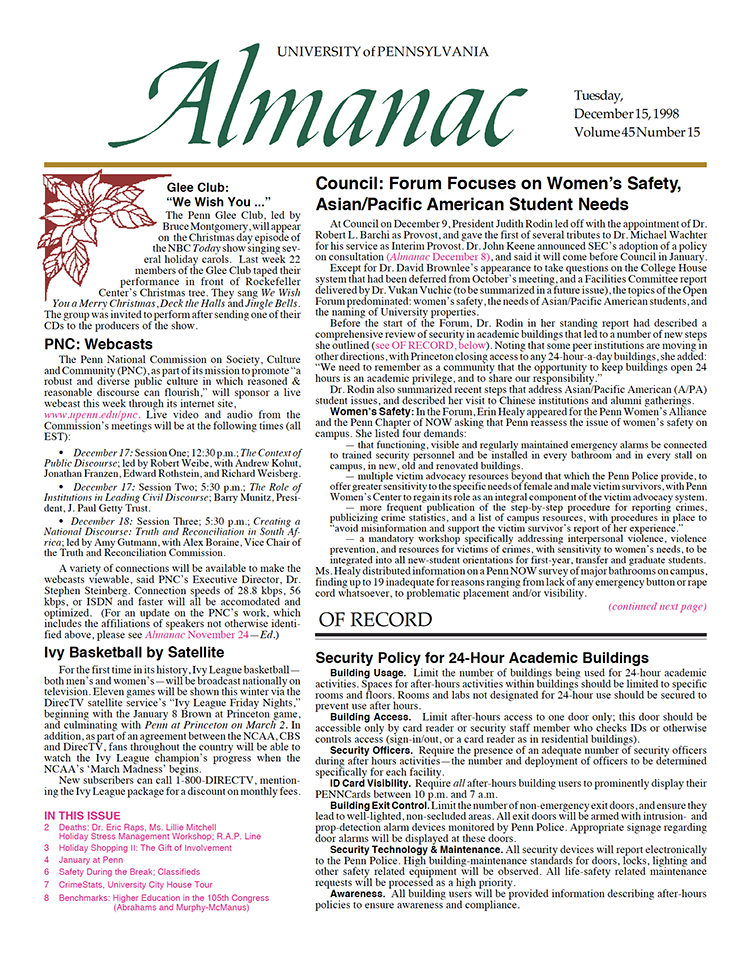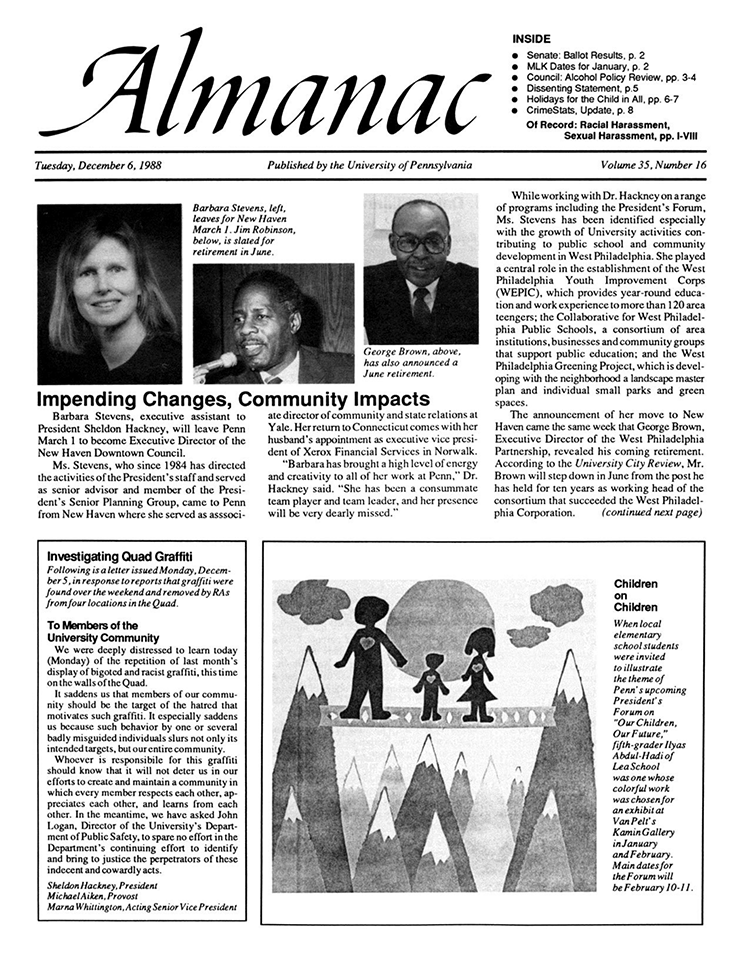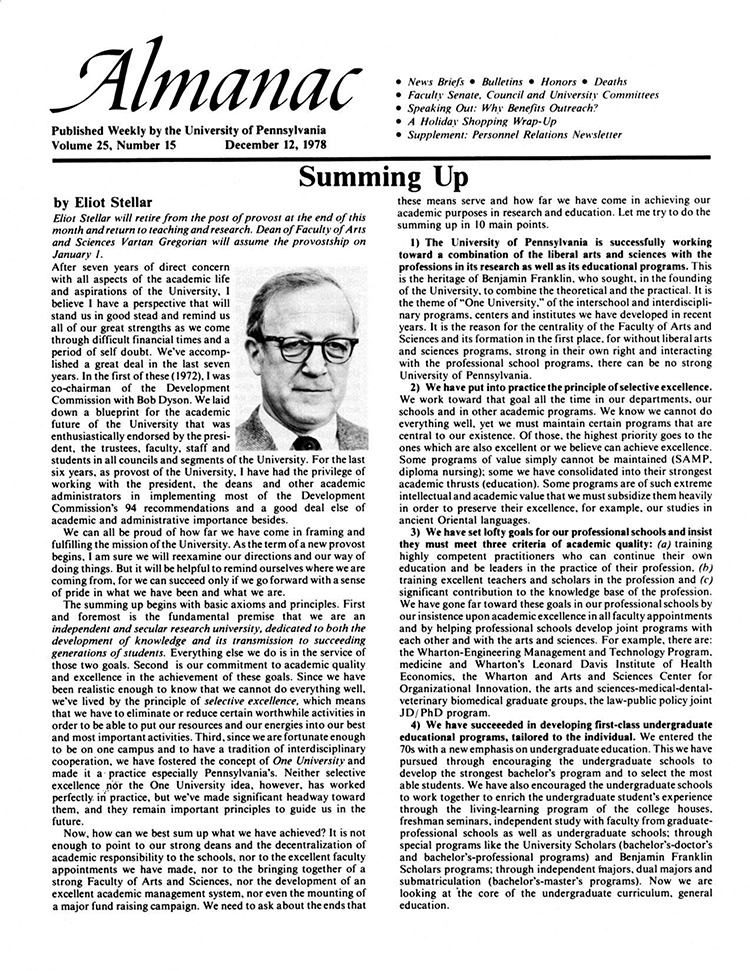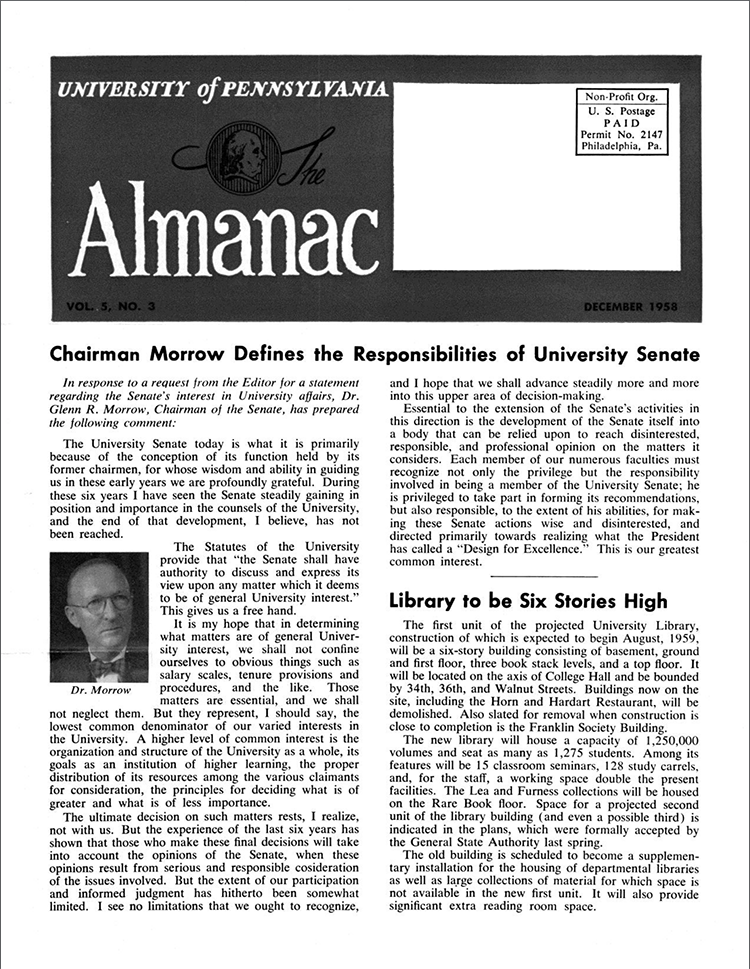Launching Penn Medicine London
Continuing its mission of high-quality patient care, cutting-edge research and innovation, and training the world’s doctors, Penn Medicine has announced it is expanding to the United Kingdom. The new Penn Medicine London officially opened in the city’s Mayfair area on November 19. The initiative, the first of its kind for Penn, provides a path for UK and EU patients to access Penn’s world-class experts and care through referrals and telemedicine, as well as opportunities for collaboration with UK medical schools.
“Penn Medicine has a long history—dating past the founding of our nation—as a global health-care leader, and we are pleased to extend our reach with a physical presence in the UK,” said Ralph Muller, CEO of the University of Pennsylvania Health System. “We have always been proud of our role in training the world, and this initiative advances that mission by opening new doors and forging new relationships both in the UK and across Europe.”
Penn Medicine’s expertise is especially highlighted by its role as a global pioneer in new approaches to cancer treatment, particularly in personalized cellular therapies and proton beam radiation. Penn developed the first US Food and Drug Administration-approved chimeric antigen receptor T cell (CAR T) therapy, which was recently approved by the European Commission (EC) for treating two aggressive forms of cancer. The approach has successfully eradicated blood cancer in hundreds of patients around the world, including in the UK. Studies show it leads to overall remission rates of 80% among acute lymphoblastic leukemia (ALL) patients whose cancer could not be contained by the standard chemotherapies doctors have relied on for decades.
Penn is also home to many other “firsts” that have paved the way for modern medicine across the globe, from founding the nation’s first medical school to performing the world’s first x-ray and discovering the first gene linked to cancer. Each day, Penn physicians and scientists propel medical science forward in hundreds of laboratories, and with mobile apps and big data.
“Penn Medicine London will provide enhanced access for patients seeking care from teams who are continuing to pioneer the next generation of prevention and treatment strategies for diseases of all kinds,” said J. Larry Jameson, executive vice president of the University of Pennsylvania for the Health System and dean of Penn’s Perelman School of Medicine. “The initiative also provides opportunities for innovative collaborations between Penn and UK and EU medical schools, including research-focused projects as well as physician exchange programs, ensuring the world’s brightest medical minds continue to share ideas and learn from each other.”
To mark the opening of its first enterprise in the UK, Penn Medicine hosted an event in London for friends and partners to gather and learn about what the institution will bring to the UK.
PCI Annual Celebration: Recognizing Faculty Trailblazers
The Penn Center for Innovation (PCI) hosted its third annual Celebration of Innovation last week to honor over 100 patent awardees and honored individuals with the most impressive startups, inventions, devices and deals.
Since Penn’s founding, innovation has been at its core, especially when it comes to the University’s game-changing faculty members. But it’s not every day that these trailblazers are recognized for their revolutionary work.
The event honored faculty members who have worked with PCI—Penn’s very own hub for innovation, venture creation and commercialization—to obtain 107 patents on their creations this past year.
“Faculty provide the input for everything we do,” said John Swartley, PCI’s associate vice provost for research and managing director. “Without their innovations, we would have no gas for our engine. This is our ‘feel good’ moment and our time to thank everyone.”
Patent awardees received personalized “patent cubes” to mark their achievements, a commemorative gift meant to accumulate in inventors’ offices as the years go on.
The event included a keynote from Wharton Dean Geoffrey Garrett, a steering committee member of PCI. It also celebrated various Penn spinout companies and leading innovators for their impressive commercialization activities—from devices to deals—during fiscal year 2018.
Deal of the Year went to Amicus Therapeutics, a biotechnology company working to create therapies to treat orphan diseases; Startup of the Year went to Tmunity Therapeutics, which is developing genetically engineered T-cells; Partner of the Year went to Johnson & Johnson Innovation, which recently opened JPOD @ Philadelphia at the Pennovation Center; Device of the Year went to Michael Kahana, who is working to develop next-generation technologies to improve memory function; Emerging Inventor of the Year went to Boon Thau Loo, whose research focuses on distributed data management systems, internet-scale query processing, and the application of database technologies to networked systems; and Inventor of the Year went to Amos Smith—“a world-renowned synthetic organic chemist who is long past due for PCI to recognize,” said Dr. Swartley.
University of Pennsylvania senior Adamseged Abebe of Gondar, Ethiopia, has been awarded an inaugural Global Rhodes Scholarship for graduate study at the University of Oxford. He is one of two chosen from countries around the world for the new award, which allows exceptional students who are from countries not historically eligible to apply.
One of the most prestigious academic honors, the Rhodes is highly competitive and draws candidates from approximately 60 countries. The new Global Rhodes Scholarships extend the opportunity to the rest of the world, subject to eligibility and university nomination.
“We are so very proud that Adamseged Abebe—Adam to his friends at Penn—is one of the two inaugural Global Rhodes Scholars,” said Penn President Amy Gutmann. “An interdisciplinary approach to global health and non-profit leadership has steered Adam to conduct essential research, making an impact for vulnerable populations in Malawi while mentoring Ethiopian children during the summer.
“His compassion and determination to help others throughout the world is the essential embodiment of a global citizen at Penn. Adam wants to make a difference in the world, and I could not be more confident that he will, aided by this well-deserved recognition as a Global Rhodes.”
Mr. Abebe is enrolled in a sub-matriculation program that will allow him to complete his bachelor’s in health and societies from the School of Arts and Sciences, along with a master’s in non-profit leadership from the School of Social Policy & Practice.
He has conducted research on mitochondrial proteins at Penn Medicine; HIV/AIDS, mental health and population health in Malawi; and the impact of Chinese investment on Ethiopian infrastructure. He has also served as a teacher and a mentor for children at a non-profit school in Ethiopia for the past three summers.
A Penn World Scholar, a Perry World House Student Fellow, a Lipman Family Prize Fellow and a Paul Robeson and Anna Julia Cooper Scholar, Mr. Abebe has served as a founder and president of the Society of African Internationals. He’s also participated in the Undergraduate Urban Research Colloquium through Penn’s Institute for Urban Research, and is a member of Alpha Phi Omega. Currently, he’s studying abroad in Brazil through the International Honors Program.
At Oxford, Mr. Abebe will pursue a master’s degree in international development.
Mr. Abebe applied for the Rhodes Scholarship with assistance from Penn’s Center for Undergraduate Research and Fellowships. The 2019 award brings the number of Penn Rhodes Scholars to 28.
Penn senior Anea Moore was recently named a 2019 American Rhodes Scholar (Almanac November 20, 2018).
Faculty Award of Merit Call for Nominations: February 28
The Faculty Award of Merit presented by Penn Alumni was established in 2014 by Penn Alumni and the Office of the Provost. It is presented annually to an individual or group of collaborators who has made an outstanding contribution to alumni education and engagement at Penn by sharing their unique scholarship work with the alumni community. Special emphasis is placed on faculty members who go above and beyond the call of duty by engaging Penn alumni with the University as their intellectual home and educate the faculty community about the alumni engagement opportunities available to them. The award consists of a formal citation and will be presented during the fall Alumni Award of Merit Gala.
All Penn faculty, staff and alumni are eligible to nominate a faculty member for this award. For more information about award criteria and eligibility or to nominate a faculty member, visit www.alumni.upenn.edu/education Nominations are due by February 28, 2019.
Summary Annual Report for the University of Pennsylvania Basic Plan
This is a summary of the annual report of The University of Pennsylvania Basic Plan (Plan No. 028) sponsored by the University of Pennsylvania, EIN: 23-1352685, for the period January 1, 2017, through December 31, 2017. This annual report has been filed with the Employee Benefits Security Administration, as required under the Employee Retirement Income Security Act of 1974 (ERISA).
Basic Financial Statement
Benefits under the plan are provided through unallocated insurance contracts and a trust fund. Plan expenses were $21,096,687. These expenses included $2,913 in administrative expenses and $21,093,774 in benefits paid to participants and beneficiaries. A total of 28,866 persons were participants in or beneficiaries of the plan at the end of the plan year.
The value of plan assets, after subtracting liabilities of the plan, was $989,608,696 as of December 31, 2017, compared to $813,770,105 as of January 1, 2017. During the plan year the plan experienced an increase in its net assets of $175,838,591. This increase includes net unrealized depreciation in the value of plan assets; that is, the difference between the value of the plan’s assets at the end of the plan year and the value of assets at the beginning of the plan year or the cost of assets acquired during the plan year. The plan had total income of $196,935,278, including employer contributions of $54,944,321, employee rollover contributions of $1,601,091, gains from investments of $140,373,886 and other income of $15,980.
Your Rights to Additional Information
Under ERISA, you have the right to receive a copy of the full annual report, or any part thereof, upon request. The items listed below are included in that report for the University of Pennsylvania Basic Plan:
- An accountant’s opinion;
- Financial information;
- Information on payments to service providers;
- Assets held for investment;
- Insurance information; and
- Information regarding pooled separate accounts in which the plan participates.
To obtain a copy of the full annual report, or any part thereof, write or call the office of the Plan Administrator, c/o Joanne M. Blythe, Retirement Manager, University of Pennsylvania, 3451 Walnut Street, 600 Franklin Building, Philadelphia, PA 19104-6205, (215) 898-9947. The charge to cover copying costs will be $5 for the full annual report or 25 cents per page for any part thereof.
You also have the right to receive from the Plan Administrator, on request and at no charge, a statement of the assets and liabilities of the plan and accompanying notes, or a statement of income and expenses of the plan and accompanying notes, or both for the University of Pennsylvania Basic Plan. If you request a copy of the full annual report from the Plan Administrator, these two statements and accompanying notes will be included as part of that report. The charge to cover copying costs given above does not include a charge for the copying of these portions of the report because these portions are furnished without charge.
You also have the legally protected right under ERISA to examine the annual reports in the offices of the Employer at the address for the Plan Administrator, above, and at the US Department of Labor in Washington, DC, or to obtain a copy from the US Department of Labor upon payment of copying costs. Requests to the Department should be addressed to: Public Disclosure Room, Room N-1513, Employee Benefits Security Administration, US Department of Labor, 200 Constitution Avenue, NW, Washington, DC 20210.
Summary Annual Report for the University of Pennsylvania Matching Plan
This is a summary of the annual report of The University of Pennsylvania Matching Plan (Plan No. 001) sponsored by the University of Pennsylvania, EIN: 23-1352685, for the period January 1, 2017, through December 31, 2017. This annual report has been filed with the Employee Benefits Security Administration, as required under the Employee Retirement Income Security Act of 1974 (ERISA).
Basic Financial Statement
Benefits under the plan are provided through unallocated insurance contracts and a trust fund. Plan expenses were $175,788,431. These expenses included $25,414 in administrative expenses and $175,763,017 in benefits paid to participants and beneficiaries. A total of 26,298 persons were participants in or beneficiaries of the plan at the end of the plan year.
The value of plan assets, after subtracting liabilities of the plan, was $4,674,037,029 as of December 31, 2017, compared to $4,079,727,416 as of January 1, 2017. During the plan year the plan experienced an increase in its net assets of $594,309,613. This increase includes net unrealized depreciation in the value of plan assets; that is, the difference between the value of the plan’s assets at the end of the plan year and the value of assets at the beginning of the plan year or the cost of assets acquired during the plan year. The plan had total income of $770,098,044, including employer contributions of $66,580,244, employee contributions of $69,907,801, employee rollover contributions of $12,493,560, earnings from investments of $620,862,679 and other income of $253,760.
Your Rights to Additional Information
Under ERISA, you have the right to receive a copy of the full annual report, or any part thereof, upon request. The items listed below are included in that report for the University of Pennsylvania Matching Plan:
- An accountant’s opinion;
- Financial information;
- Information on payments to service providers;
- Assets held for investment;
- Insurance information; and
- Information regarding pooled separate accounts in which the plan participates.
To obtain a copy of the full annual report, or any part thereof, write or call the office of the Plan Administrator, c/o Joanne M. Blythe, Retirement Manager, University of Pennsylvania, 3451 Walnut Street, 600 Franklin Building, Philadelphia, PA 19104-6205, (215) 898-9947. The charge to cover copying costs will be $5 for the full annual report or 25 cents per page for any part thereof.
You also have the right to receive from the Plan Administrator, on request and at no charge, a statement of the assets and liabilities of the plan and accompanying notes, or a statement of income and expenses of the plan and accompanying notes, or both for the University of Pennsylvania Matching Plan. If you request a copy of the full annual report from the Plan Administrator, these two statements and accompanying notes will be included as part of that report. The charge to cover copying costs given above does not include a charge for the copying of these portions of the report because these portions are furnished without charge.
You also have the legally protected right under ERISA to examine the annual reports in the offices of the Employer at the address for the Plan Administrator, above, and at the US Department of Labor in Washington, DC, or to obtain a copy from the US Department of Labor upon payment of copying costs. Requests to the Department should be addressed to: Public Disclosure Room, Room N-1513, Employee Benefits Security Administration, US Department of Labor, 200 Constitution Avenue, NW, Washington, DC 20210.
Summary Annual Report for the Supplemental Retirement Annuity Plan of the University of Pennsylvania
This is a summary of the annual report of The Supplemental Retirement Annuity Plan of the University of Pennsylvania (Plan No. 002) sponsored by the University of Pennsylvania, EIN: 23-1352685, for the period January 1, 2017, through December 31, 2017. This annual report has been filed with the Employee Benefits Security Administration, as required under the Employee Retirement Income Security Act of 1974 (ERISA).
Basic Financial Statement
Benefits under the plan are provided through unallocated insurance contracts and a trust fund. Plan expenses were $37,201,474. These expenses included $840 in administrative expenses and $37,200,634 in benefits paid to participants and beneficiaries. A total of 25,751 persons were participants in or beneficiaries of the plan at the end of the plan year.
The value of plan assets, after subtracting liabilities of the plan, was $1,248,527,917 as of December 31, 2017, compared to $1,036,688,990 as of January 1, 2017. During the plan year the plan experienced an increase in its net assets of $211,838,927. This increase includes net unrealized depreciation in the value of plan assets; that is, the difference between the value of the plan’s assets at the end of the plan year and the value of assets at the beginning of the plan year or the cost of assets acquired during the plan year. The plan had total income of $249,040,401 including employee contributions of $49,994,629, employee rollover contributions of $37,073,352, gains from investments of $161,883,135 and other income of $89,285.
Your Rights to Additional Information
Under ERISA, you have the right to receive a copy of the full annual report, or any part thereof, upon request. The items listed below are included in that report for the Supplemental Retirement Annuity Plan of the University of Pennsylvania:
- An accountant’s opinion;
- Financial information;
- Information on payments to service providers;
- Assets held for investment;
- Insurance information; and
- Information regarding pooled separate accounts in which the plan participates.
To obtain a copy of the full annual report, or any part thereof, write or call the office of the Plan Administrator, c/o Joanne M. Blythe, Retirement Manager, University of Pennsylvania, 3451 Walnut Street, 600 Franklin Building, Philadelphia, PA 19104-6205, (215) 898-9947. The charge to cover copying costs will be $5 for the full annual report or 25 cents per page for any part thereof.
You also have the right to receive from the Plan Administrator, on request and at no charge, a statement of the assets and liabilities of the plan and accompanying notes, or a statement of income and expenses of the plan and accompanying notes, or both for the Supplemental Retirement Annuity Plan of the University of Pennsylvania. If you request a copy of the full annual report from the Plan Administrator, these two statements and accompanying notes will be included as part of that report. The charge to cover copying costs given above does not include a charge for the copying of these portions of the report because these portions are furnished without charge.
You also have the legally protected right under ERISA to examine the annual reports in the offices of the Employer at the address for the Plan Administrator, above, and at the US Department of Labor in Washington, DC, or to obtain a copy from the US Department of Labor upon payment of copying costs. Requests to the Department should be addressed to: Public Disclosure Room, Room N-1513, Employee Benefits Security Administration, US Department of Labor, 200 Constitution Avenue, NW, Washington, DC 20210.
Summary Annual Report for University of Pennsylvania Health and Welfare Plan for Retirees and Disabled Employees
This is a summary of the annual report of the University of Pennsylvania Health and Welfare Plan for Retirees and Disabled Employees (Plan No. 530), sponsored by The Trustees of the University of Pennsylvania, EIN 23-1352685 for the period that began on January 1, 2017 and ended on December 31, 2017. The annual report has been filed with the Employee Benefits Security Administration as required under the Employee Retirement Income Security Act of 1974 (ERISA). Please note that not all employees are eligible to participate in the Plan. Please consult your Plan materials for specific eligibility information.
Retiree benefits were provided through a combination of self-insured payments from the University’s general assets, payments from a trust fund established to fund retiree benefits and insurance contracts with third party insurance companies.
Medical, Dental and Prescription Drug Benefits
Insurance Information
The Plan has contracts with Aetna Health, Inc., Keystone Health Plan East, AmeriHealth and Metropolitan Life Insurance Company to pay medical and dental claims incurred under the terms of the contracts. The total premiums paid for the plan year ending December 31, 2017 were $905,039.
Basic Financial Information
The value of Plan assets, after subtracting liabilities of the Plan, was $483,851,190 as of December 31, 2017, compared to $407,178,000 as of January 1, 2017. During the plan year the Plan experienced an increase in its net assets of $76,673,190. This increase includes net unrealized depreciation in the value of Plan assets; that is, the difference between the value of the Plan’s assets at the end of the year and the value of assets at the beginning of the year or the cost of assets acquired during the year. The Plan had total income of $98,374,233, including employee contributions of $6,973,697, employer contributions of $26,468,339 and gains from investments of $64,932,197.
Plan expenses were $21,701,043. These expenses included $1,837,574 in administrative expenses and $19,863,469 in benefits paid to participants and beneficiaries.
Life Insurance Benefits
The Plan has a contract with Aetna Life Insurance Company to pay life insurance claims incurred under the terms of the contract. The total premiums paid under this contract for the plan year ending December 31, 2017 were $800,256.
Your Rights To Additional Information
You have the right to receive a copy of the full annual report, or any part thereof, on request. The items listed below are included in that report:
- An accountant’s opinion;
- Financial information;
- Information on payments to service providers;
- Assets held for investment; and
- Insurance information.
To obtain a copy of the full annual report, or any part thereof, write or call the office of the Plan Administrator, c/o Joanne M. Blythe, Retirement Manager, University of Pennsylvania, 3451 Walnut Street, 600 Franklin Building, Philadelphia, PA 19104-6205, (215) 898-9947. The charge to cover copying costs will be $5 for the full annual report or 25 cents per page for any part thereof.
You also have the right to receive from the Plan Administrator, on request and at no charge, a statement of the assets and liabilities of the Plan and accompanying notes, or a statement of income and expenses of the plan and accompanying notes, or both. If you request a copy of the full annual report from the Plan Administrator, these two statements and accompanying notes will be included as part of that report. The charge to cover copying costs given above does not include a charge for the copying of these portions of the report because these portions are furnished without charge.
You also have the legally protected right under ERISA to examine the annual reports in the offices of the Employer at the address for the Plan Administrator, above, and at the US Department of Labor in Washington, DC, or to obtain a copy from the US Department of Labor upon payment of copying costs. Requests to the Department should be addressed to: Public Disclosure Room, Room N-1513, Employee Benefits Security Administration, US Department of Labor, 200 Constitution Avenue, N.W., Washington, DC 20210.

_resized.jpg) Dorothy Cheney, emeritus professor of biology in the School of Arts and Sciences at the University of Pennsylvania and renowned primate researcher, died November 9 at her home in Devon, Pennsylvania, from breast cancer. She was 68.
Dorothy Cheney, emeritus professor of biology in the School of Arts and Sciences at the University of Pennsylvania and renowned primate researcher, died November 9 at her home in Devon, Pennsylvania, from breast cancer. She was 68.-resized.jpg) Donald White, emeritus professor of archaeology at the University of Pennsylvania and curator-in-charge of the Penn Museum’s Mediterranean section for more than 30 years, died on November 21 from injuries sustained in a car accident. He was 83.
Donald White, emeritus professor of archaeology at the University of Pennsylvania and curator-in-charge of the Penn Museum’s Mediterranean section for more than 30 years, died on November 21 from injuries sustained in a car accident. He was 83. December 2008: Easing the Burdens Placed on Patient Families: Penn Medicine to Build Philadelphia’s First Adult Transplant House
December 2008: Easing the Burdens Placed on Patient Families: Penn Medicine to Build Philadelphia’s First Adult Transplant House December 1998: Council: Forum Focuses on Women’s Safety, Asian/Pacific American Student Needs
December 1998: Council: Forum Focuses on Women’s Safety, Asian/Pacific American Student Needs December 1988: Impending Changes, Community Impacts
December 1988: Impending Changes, Community Impacts December 1978: Summing Up by Eliot Stellar
December 1978: Summing Up by Eliot Stellar.png) December 1968: Advisory Board Named For Chemical Senses Center
December 1968: Advisory Board Named For Chemical Senses Center December 1958: Library to be Six Stories High
December 1958: Library to be Six Stories High





